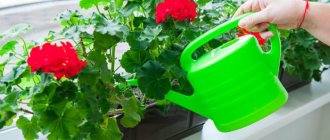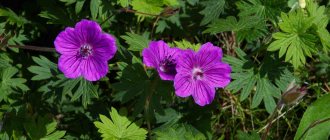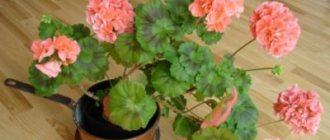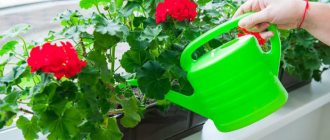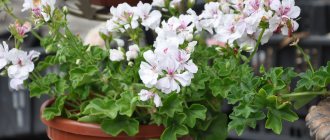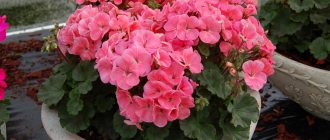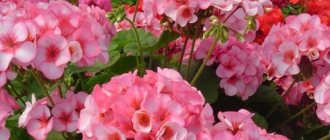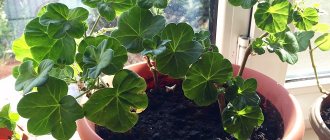Pelargonium rosebud - botanical description and classification
Pelargonium came to Europe from Africa thanks to travelers and colonialists. According to the description, it belongs to the Geraniaceae family. Various plant varieties are adapted for growing indoors and in open ground.
Pelargonium rosebud
Due to the diversity of flower varieties, as well as the many hybrid varieties, today there is no clear classification. The most common types of pelargonium are:
- zonal;
- ivy-leaved or ampelous;
- royal;
- angels;
- unique;
- fragrant.
Geranium rosebud, otherwise called Rosaceae, arose due to an accidental mutation in the 18th century. Subsequent breeding work was carried out purposefully, as a result of which a huge variety of varieties of rose-shaped pelargoniums were bred.
Varieties of indoor plants
How to care for ampelous geraniums at home
Geranium varieties are distinguished by their lush flowering and a wide palette of colors. Not only flowers, but also leaf blades of some varieties can have a decorative appearance.
A huge number of rosebund pelargoniums have been bred
- Rose of Amsterdam
"Rose of Amsterdam" is one of the miniature, fast-growing varieties. Terry inflorescences are painted in white and pink shades. As the plant ages, the buds become more and more vibrant.
- Supreme
"Rosebud Supreme" is distinguished by rich crimson, densely double flowers with white undersides of the petals. Under proper conditions, flowering can continue year-round.
For reference! Supreme typically enters the flowering season later than similar varieties.
- Apple Blossom
"Apple Blossom Rosebud" is one of the oldest varieties of pelargonium. It has, as the name suggests, a delicate apple green coloration with a rich pink edging.
The variety is quite whimsical and requires shading, frequent fertilization and pruning.
- Vectis
“Vectis Rosebud” is a miniature zonal variety with large wine-red buds and a light underside of the petals. Lush, disheveled inflorescences last a long time. The leaves are dark green.
- Red pelargonium "Rosebud Red"
Pelargonium Rosebud Red with deep red flowers. The inflorescences are densely packed and form almost continuously throughout the year. Does not require molding.
- Beverly park
Pelargonium with double, apricot-colored buds with a lighter, almost white edging. The leaf blades are green, darkening towards the central part.
For reference! Beverly Park - suitable for those who prefer a non-standard red color scheme.
- Princess Mary
Compact early flowering variety. The leaves are uniform green. The inflorescences are dense, greenish-white. As they fade, the petals turn pink.
- Rushmoor Golden Rosebud
Rushmoor Gold features bright pink flowers that are not too densely packed. The leaf blades are light, golden-green in color.
The best varieties
There are very, very many flowering varieties of pelargonium bred by breeders. Among the most popular are pelargonium varieties Rosebud supreme, Red scarlet, Snow and Arctic. Consider the key characteristics of the most popular varieties of rosacea geraniums in order to have only exceptional varieties in your garden:
Pelargonium Vectis rosebud. A mature shrub that looks miniature, but looks very attractive. In addition, such a plant is not difficult to form. Among the main advantages of the variety is lush and long-lasting flowering. The roses have a bright red hue. Interestingly, the petals on the outside are slightly lighter than on the inside. Having planted such a shrub in your garden plot, you will admire its flowering for a long time; Pink rambler. Just like pelargonium, the Red Rambler variety is considered one of the most famous flower varieties. This shrub is very bright and lush, its leaves have a corrugated shape, and the flowers are bright pink with a hint of red. The true charm of this specimen is given by the exceptional shape of the petals, as well as the presence of a lighter shade on their front side; Pelargonium Bornholm. On such a shrub, the flowers open rather slowly. They have a rich red hue, and the texture is very satin-like in appearance. Be patient until this geranium blooms completely. But in the future she will not shed her beautiful buds for a long time. However, flowers are not the only advantage of the variety.
Flower growers often pay attention to the amazing mesh pattern on the leaves of the plant; pelargonium variety Vit rosen. The flowers of this specimen are rich white in color, but at the base the petals have a greenish tint.
They are double, so they form very lush inflorescences; pelargonium variety Arctic snow. It is not difficult to guess what color the petals of this relatively young variety are. However, a characteristic feature of the plant in the “snow” shade is the star-shaped shape of the petals, which can be covered with stripes; Pelargonium domestica Black pearl. This zonal plant forms voluminous, lush inflorescences of raspberry-red color. When the buds just open, they have a predominant burgundy color. Such a flower is considered finicky to care for (for example, the shape of a bush is difficult to shape), but it blooms incomparably.
Whatever variety of pelargonium you prefer - Red Scarlet, Arctic Snow or Red Rambler - this flower will become an original decoration for your blooming corner, because its beauty is in no way inferior to even a rose.
Flower passion.
I love all living plants. I see a highlight in each of them. But my strongest flower passion in recent years has been pelargoniums.
Dear readers, at the moment I have a small but amazingly beautiful collection of unusually blooming pelargoniums. I have “Rosebud” - pelargoniums blooming with roses, Tulip - blooming with tulips, asters, carnations, one variety - peonies. There are several fragrant varieties, with the scent of rose, lemon, wormwood, peach, and apple. And I want to share all this wealth with you.
Terms of sale of pelargoniums 2022
Sales all year round, subject to delivery by a transport company, by bus, I arrange it myself. To the order amount you need to add approximately 400 rubles for transportation and packaging. I don’t send pelargoniums by mail because they don’t arrive well, then they get sick for a long time and, as a rule, they don’t survive.
My email address
Viber and WhatsApp tel.
1. Pelargoniums of the Rosebud series and Rosaceae
Apple Blossom Rosebud is a rosaceous zonal pelargonium. The plant is very large and fast growing. It requires the initial formation of the bush, and then it will show all the beauty and harmony of flowering. Loves very “fat” soil. Last year I fed them with liquid fertilizers for the flowering ones, but this year I just planted them in “humus” in the spring. The variety blooms very profusely, begins early in the spring and, probably, if not pruned in the fall, will bloom into the winter. This photo is fresh from autumn, I published it only because of its good quality, it does not reflect the true beauty of the variety. In summer the hats are much larger and denser. I especially admire roses - large white ones with a green center and pink edging of delicate petals.
2. Pelargoniums of the Tulip series, blooming tulips
Caring for rosebud pelargonium at home
Varieties of geraniums - what lemon and field geraniums look like
Rose geranium requires special treatment; it should be cared for by following certain rules. By adhering to them, you can achieve long-lasting lush flowering.
Watering should be regular and moderate
Illumination and temperature conditions
Pelargonium rosebud tolerates bright sunlight and partial shade. On a personal plot, it can be planted on an alpine hill, placed in a hanging flowerpot, or placed in a flowerpot in the shade of trees.
Note! When there is a lack of lighting, geranium foliage becomes lighter and may fall off, the stems become elongated, and flowering is delayed or does not occur at all.
The flower does not tolerate heat very well. Maximum permissible temperature 28 °C. Otherwise, the plant will become lethargic, and the flowers will fall off earlier than expected.
Watering rules and humidity
Pelargonium bushes should be watered sparingly. The flower tolerates drought much easier than excessive moisture and stagnation of water.
The plant almost does not react to a decrease in the level of air humidity in the room. In rare cases, the edges of the leaves may dry out.
It is not advisable to spray pelargonium. The accumulation of moisture on fuzzy leaves can cause them to rot. You can humidify the air using a tray with pebbles and water.
Fertilizing and soil quality
Soil for rosebud geranium when caring at home can be purchased in specialized stores or mixed with your own hands. Taking a universal soil mixture, you can add perlite and sand to it to achieve better air permeability.
Self-preparation of soil involves the following proportions of components:
- peat - 2 parts;
- turf soil - 4 parts;
- river sand and perlite - 1 part each;
- humus - 2 parts.
It is recommended to feed the flower from the end of February. The application of nitrogen-containing fertilizers will allow the bush to gain green mass. Closer to the onset of the flowering period, they begin to add potassium and phosphorus to the fertilizing.
Rosebud pelargonium requires feeding
Flower container size
Flowerpots for rose-shaped geraniums are selected to be small, made of unglazed ceramics. The soil in such a container will dry out better and the roots will receive enough air.
Pruning and replanting
Rosebud pelargonium is pruned twice a year. In autumn, old shoots that have shed their leaves are cut off, and elongated stems are shortened by at least a third. In spring, only gentle pinching is done, otherwise the plant may not bloom on time.
Replanting is carried out as the bush grows, but at least once every 2 years. You can tell that the pots need to be replaced by the roots coming out through the drainage holes.
Transplantation can also be carried out for the purpose of propagation by separating independent young bushes. It is recommended to carry out the procedure in the spring.
Features of planting and care
Pelargonium Sutarves Klara San
If we compare all types of plants, pelargonium is finicky. It should only be planted in pots. It is necessary to protect the flower from the influence of winds, rain and temperature changes. There should be regular air circulation in the room, without drafts. The plant needs full lighting, so it needs to be turned around periodically. With the arrival of the warm season, the pots can be taken out into the fresh air. Once a year you need to change the soil composition. Pelargonium should be protected from direct sunlight.
Features of plant flowering
Caring for ampelous geranium or ivy-leaved pelargonium: diseases and pests
Without its luxurious inflorescences, geranium looks unattractive. You can achieve abundant flowering from it by providing suitable conditions.
Typically, pelargonium blooms in spring and summer. With the onset of the autumn-winter period, only those plants for which the optimal lighting regime has been created will bloom. When kept on a southern or western window, the inflorescences may not leave the bush throughout the summer. But it is worth considering that without proper rest they will gradually become smaller, less lush and bright.
In appearance, the inflorescences and the flowers of rosebud geranium themselves may differ depending on what varieties and species were used when breeding this particular plant. The buds of some hybrids are very dense and most similar to roses, like those of red rosebud pelargonium. In other varieties, the buds may be more disheveled and loose.
Pelargonium pruning and rejuvenating bush transplantation
Pruning pelargonium photo How to prune pelargonium
All pelargoniums grow in height very quickly. And over time, the stems “go bald”. Therefore, the flower needs constant pruning. Without this, the bush will lose its decorative properties and may stop throwing out buds. Pruning is also used to rejuvenate the bush. The right time for this is autumn.
Pelargonium transplant photo
Not only the top is cut off, but also the edges of the earthen clod along with the roots. In the spring, during transplantation, it is also advisable to prune pelargonium.
Trimmed and transplanted pelargonium photo
But it should be noted that pruning delays flowering by 3-4 months. In order to form a low and fluffy bush with large inflorescences, you need to cut it short, leaving small stumps, about 5 cm. Cut a suitable branch just above the internode. The cut should be oblique
It is also important to ensure that after pruning there are buds that do not grow deep into the bush. Pelargonium is pinched to form a dense crown.
Flower propagation methods
Rosebud geranium reproduces just like any other variety. Most often, two methods are used: cuttings and sowing seeds.
Cuttings can be immediately planted in the ground
Reproduction by cuttings
This method can be used at any time of the year. For germination, lateral shoots with 2-3 leaves are cut from the bush.
A cut of the cutting is dipped in crushed activated carbon and placed in a shaded place for several hours. After this procedure, the cuttings can be placed in water to germinate roots.
Propagation by seeds
Propagation of geraniums by sowing seed material is a rather labor-intensive process. But in this case you can get many young viable plants.
The seeds are planted at a distance of 5 cm from each other, kept in a growth stimulator. A greenhouse is built over the crops, placed on a lighted windowsill, after which it is regularly ventilated and watered by spraying.
Additional Information! To speed up the appearance of sprouts, the seeds can be rubbed on sandpaper.
Planting an overseas beauty
Only by planting pelargonium correctly can you expect that it will delight its owners with luxurious flowers.
Choosing a site for planting and preparing the soil
This plant can be grown in a room, but also on a balcony or planted in a garden. When planting, it is recommended to use not pure soil, but mixed with peat or other substance, which will make the soil more loose.
Landing dates
Transplantation into the ground is carried out in the spring. Before doing this, the soil must be fertilized. To do this, you can use a self-prepared mixture, which will include:
- peat;
- turf land;
- perlite;
- coarse sand;
- humus.
To leave the mixture, you will need to prepare the starting substances in the ratio 2:4:1:1:2 and mix them thoroughly. You can instead use store-bought soil that is neutrally acidic (pH 5.5-6.5).
Growing problems, diseases and pests
Geraniums may look unhealthy for several main reasons, which are listed below. To protect the flower, they resort to regular inspection:
- Yellowing of the leaves indicates excessive dryness of the air in the room and lack of lighting. You can cope with the problem by moving the pots with geraniums to a suitable place.
- Lethargy of leaves and stems means an excess of moisture at the roots of the plant. In such a situation, it is important to adjust watering.
- Rose flowers dry and wither when the plant is infected with a fungal infection. Treating the bush twice with Fitosporin at weekly intervals may help.
- When a bacterial disease occurs, geranium leaves become covered with brown spots. The solution is urgent transplantation into disinfected soil, treatment with fungicides and regulation of the watering regime.
- Although the plant repels most insect pests, it can be destroyed by aphids or whiteflies. Get rid of them using appropriate insecticides.
Rosebud geranium blooms very luxuriantly
With proper care, the gardener will not have to face problems when growing pelargonium.
The beauty of rosebud geranium flowers, which look like miniature, almost toy roses, is unique. The appearance of the lush inflorescences of pink pelargonium justifies and covers all the efforts that were made to grow the plant in a home or apartment.
